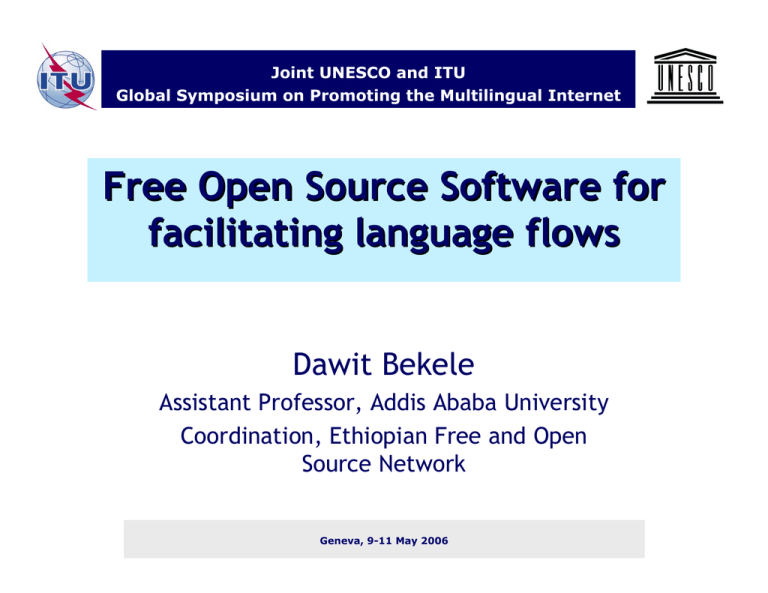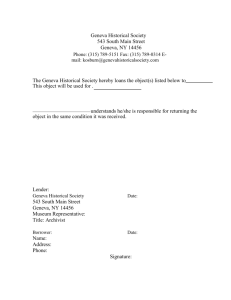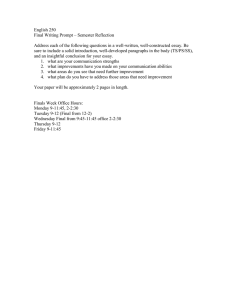Free Open Source Software for facilitating language flows Dawit Bekele
advertisement

Joint UNESCO and ITU Global Symposium on Promoting the Multilingual Internet Free Open Source Software for facilitating language flows Dawit Bekele Assistant Professor, Addis Ababa University Coordination, Ethiopian Free and Open Source Network Geneva, 9-11 May 2006 Introduction o o o o Multilingualism is increasingly considered as very important for the stability, peace and development in the world It should be nurtured in the real world as well as in the cyberspace However, the cyberspace tend to be dominated by some “major” languages This presentation tries to • • • show the discrepancy that exists in terms of the languages in the world and the cyberspace Identify hardware and software causes Propose solutions Geneva, 9-11 May 2006 2 Languages of the world Source: Weber 1997 Geneva, 9-11 May 2006 3 Languages of the world Language Mandarin Population 1,100,000,000 English 330,000,000 Spanish 300,000,000 Hindi/Urdu 250,000,000 Arabic 200,000,000 Bengali 185,000,000 Portuguese 160,000,000 Russian 160,000,000 Japanese 125,000,000 German 100,000,000 French 75,000,000 Geneva, 9-11 May 2006 4 Languages on the cyberspace – On-line population Source: Global Reach (global-reach.biz/globstats) Geneva, 9-11 May 2006 5 Languages on the cyberspace - Content Portuguese Russian Italian Korean Other 1% 2% 2% 1% 5% Spanish 2% French 3% Chinese 4% German 6% Japanese 6% English 68% Source: Global Reach (global-reach.biz/globstats) Geneva, 9-11 May 2006 6 Problems o Many languages do not exist in the cyberspace • 90% of languages are not found on the Internet [Source: http://alumni.indiana.edu/lostlanguages/stats.html] • Thousands of languages worldwide are absent from Internet content [Source: UNESCO] Geneva, 9-11 May 2006 7 Problems … o The proportion of language of the content on the cyberspace is very different from that of the population • English — 11% of the population of the world speaks English — 35% of on-line population has English as a native language — 68% of the cyberspace content is in English • Mandarin — 38% of the population of the world speaks Mandarin — 13.7% of on-line population has Mandarin as a native language — 4% of the cyberspace content is in Mandarin • There are many languages of the world where the situation is much worse than Mandarin Geneva, 9-11 May 2006 8 Why this discrepancy? o Economic • Digital divide o Technological • The focus of this presentation o Two main technological problems • Problem to develop the digital content in the languages using computer hardware and software • Problem of representation of content Geneva, 9-11 May 2006 9 Problem to develop the digital content o Difficulty to find hardware that supports some languages’ scripts (ex. Keyboard) o Difficulty to find the software to develop content in the language of the content • Example: Ethiopic content has been developed for decades with software with English interface o Limits the number of people who can develop content in that language Geneva, 9-11 May 2006 10 Problem to develop the digital content … o What is the solution? • Localization – change the interface of the software to local languages, culture and tradition • For decades, proprietary software developers didn’t want to localize for languages that do not have economic power —Example: Microsoft just started to be interested in African languages • Recently, many localizations are being done using Free and Open Source Software Geneva, 9-11 May 2006 11 Problem to develop the digital content … o What is the solution … • Free and open source software (FOSS) gives the freedom to —Copy —Distribute —… • FOSS provides the source code that anybody can modify • FOSS is gaining a lot of popularity around the world • A lot of software have been localized thanks to FOSS Geneva, 9-11 May 2006 12 FOSS gives the freedom to localize o No need of authorization to localize a FOSS software o Economic reasons not to localize are much less important than with proprietary software • The developers are not necessarily the localizers • Localizers have other reasons (pride, political will, technical interest, etc.) o Since the source code is available all sorts of localization are possible • Time and date localization • Customization Geneva, 9-11 May 2006 13 Problem of representation of content o There are hundred of alphabets and scripts used to represent o o o o the content in the languages of the world • Latin for Western European • Cyrilic for Eastern European • Ethiopic for Ethiopia and Eritrea • … Until the 1990s ASCII, was the standard of Internet and was adequate only for Latin based languages It was necessary to use complex methods just to represent the content of other scripts and alphabets • Ex: Amharic: Image, Specific downloadable font, etc. UNICODE is solving the problem of encoding since it is the CODE of the world scripts and alphabets But there are other standards that need to consider multilingualism (ex. XML) in order to be able to develop a content in any language with the same ease as in English Geneva, 9-11 May 2006 14 Conclusion o The first step towards multilingualism in the cyberspace is to have, in the cyberspace, content in all languages of the world in a proportion that respects the population of the world o The use of FOSS can help achieve this objective since it facilitates localization, which in turn facilitates development of content in local languages Geneva, 9-11 May 2006 15

